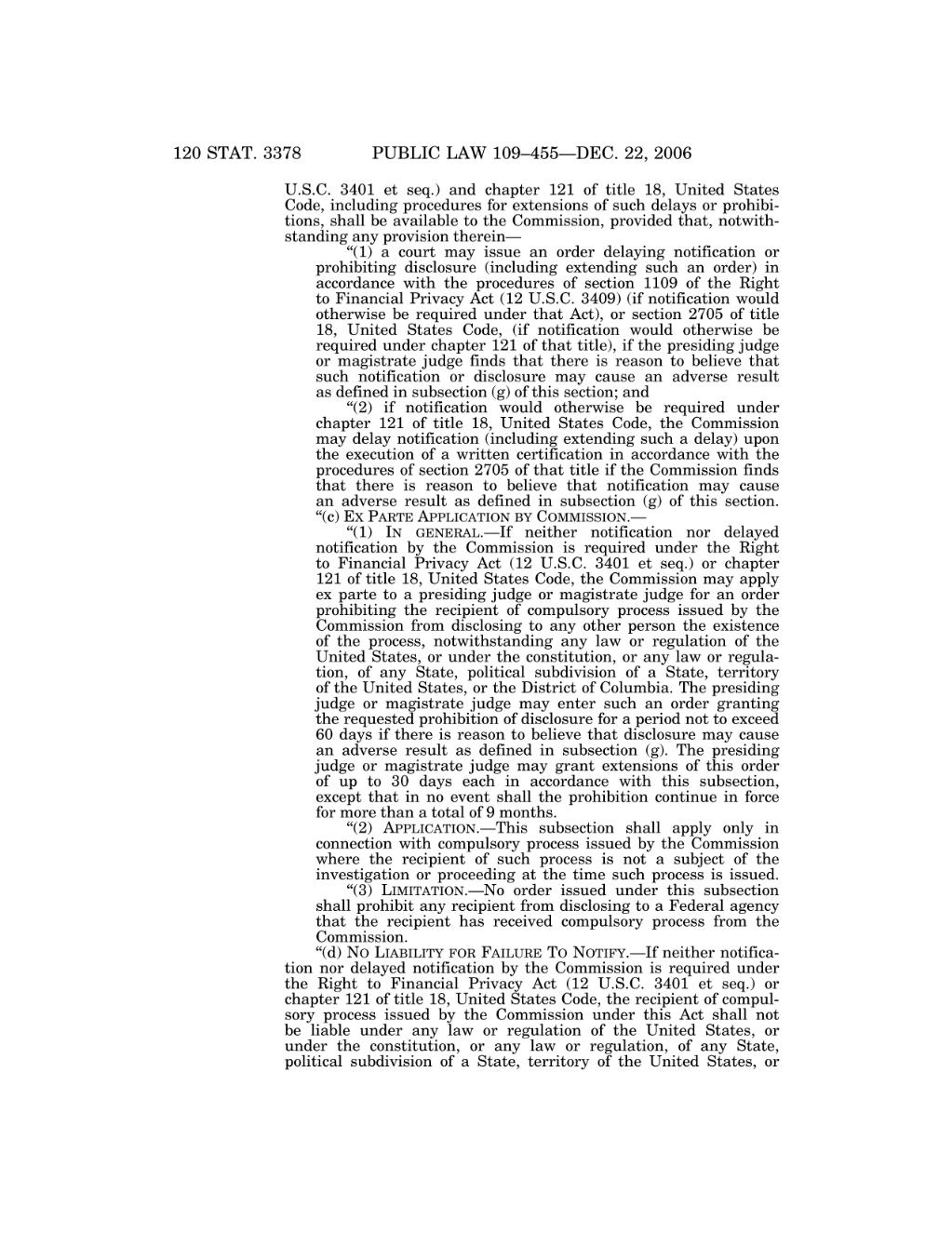120 STAT. 3378
PUBLIC LAW 109–455—DEC. 22, 2006
U.S.C. 3401 et seq.) and chapter 121 of title 18, United States Code, including procedures for extensions of such delays or prohibitions, shall be available to the Commission, provided that, notwithstanding any provision therein— ‘‘(1) a court may issue an order delaying notification or prohibiting disclosure (including extending such an order) in accordance with the procedures of section 1109 of the Right to Financial Privacy Act (12 U.S.C. 3409) (if notification would otherwise be required under that Act), or section 2705 of title 18, United States Code, (if notification would otherwise be required under chapter 121 of that title), if the presiding judge or magistrate judge finds that there is reason to believe that such notification or disclosure may cause an adverse result as defined in subsection (g) of this section; and ‘‘(2) if notification would otherwise be required under chapter 121 of title 18, United States Code, the Commission may delay notification (including extending such a delay) upon the execution of a written certification in accordance with the procedures of section 2705 of that title if the Commission finds that there is reason to believe that notification may cause an adverse result as defined in subsection (g) of this section. ‘‘(c) EX PARTE APPLICATION BY COMMISSION.— ‘‘(1) IN GENERAL.—If neither notification nor delayed notification by the Commission is required under the Right to Financial Privacy Act (12 U.S.C. 3401 et seq.) or chapter 121 of title 18, United States Code, the Commission may apply ex parte to a presiding judge or magistrate judge for an order prohibiting the recipient of compulsory process issued by the Commission from disclosing to any other person the existence of the process, notwithstanding any law or regulation of the United States, or under the constitution, or any law or regulation, of any State, political subdivision of a State, territory of the United States, or the District of Columbia. The presiding judge or magistrate judge may enter such an order granting the requested prohibition of disclosure for a period not to exceed 60 days if there is reason to believe that disclosure may cause an adverse result as defined in subsection (g). The presiding judge or magistrate judge may grant extensions of this order of up to 30 days each in accordance with this subsection, except that in no event shall the prohibition continue in force for more than a total of 9 months. ‘‘(2) APPLICATION.—This subsection shall apply only in connection with compulsory process issued by the Commission where the recipient of such process is not a subject of the investigation or proceeding at the time such process is issued. ‘‘(3) LIMITATION.—No order issued under this subsection shall prohibit any recipient from disclosing to a Federal agency that the recipient has received compulsory process from the Commission. ‘‘(d) NO LIABILITY FOR FAILURE TO NOTIFY.—If neither notification nor delayed notification by the Commission is required under the Right to Financial Privacy Act (12 U.S.C. 3401 et seq.) or chapter 121 of title 18, United States Code, the recipient of compulsory process issued by the Commission under this Act shall not be liable under any law or regulation of the United States, or under the constitution, or any law or regulation, of any State, political subdivision of a State, territory of the United States, or
VerDate 14-DEC-2004
12:05 Jul 13, 2007
Jkt 059194
PO 00003
Frm 00181
Fmt 6580
Sfmt 6581
E:\PUBLAW\PUBL003.109
APPS06
PsN: PUBL003
�
